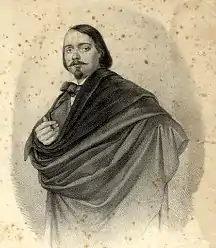Di quella pira
"Di quella pira" is a short tenor aria (or more specifically, a cabaletta) sung by Manrico in act 3, scene 2, of Giuseppe Verdi's opera Il trovatore. It is the last number of the act.

Setting
In a chamber adjoining the chapel at Castellor, Leonora and Manrico vow their love for each other. After Manrico's aria "Ah sì, ben mio coll'essere" ("Ah, yes, my love, in being yours"), they are about to take their marriage vows. However, Ruiz, Manrico's comrade, suddenly returns to report that Manrico's mother Azucena is to be burned at the stake. Manrico calls together his soldiers and sings of how they will save Azucena from death: "Di quella pira l'orrendo foco tutte le fibre m'arse, avvampò!..." ("The horrible blaze of that pyre burned, enflamed all of my being!...")
Music
The vocal range is from E3 to A4 with a tessitura from G3 to G4, with three optional high C5's.[1] The key signature is C major and the time signature is a triple metre; it is 39 bars long.
Libretto
Manrico
Di quella pira l'orrendo foco
Tutte le fibre m'arse avvampò!...
Empi spegnetela, o ch'io tra poco
Col sangue vostro la spegnerò...
Era già figlio prima d'amarti
Non può frenarmi il tuo martir.
Madre infelice, corro a salvarti,
O teco almeno corro a morir!
Leonora
Non reggo a colpi tanto funesti...
Oh quanto meglio sarìa morir!
Ruiz, Chorus of soldiers
All'armi, all'armi! eccone presti
A pugnar teco, teco a morir.
Of that dark scaffold, those flames ascending,
Thrill thro' each fibre with madd'ning glow!
Quench them, ye monsters vile or, still offending,
To stay their fury, your blood shall flow!
I was her offspring, ere love I gave thee,
In vain, to hold me, thy griefs would try.
Mother unhappy! I fly to save thee,
Or, all else failing, with thee to die!
Such heavy sorrows my heart o'erpow'ring.
Oh! better far would it be to die!
Arouse ye to arms now!
The foe we will defy![2]
References
- Libretto: Il tovatore, Parte Terza on the Giuseppe Verdi official web site (giuseppeverdi.it). Accessed 6 March 2008
- "Di quella pira", The Aria Database
- Trovatore. New York: Charles F. Tretbar. pp. 26–29., English words by Theodore T. Barker
External links
- "Di quella pira" sung by Enrico Caruso – MP3 file on The Internet Archive
- "Di quella pira" on YouTube, Jonas Kaufmann, live from the Bavarian State Opera, 5 July 2013